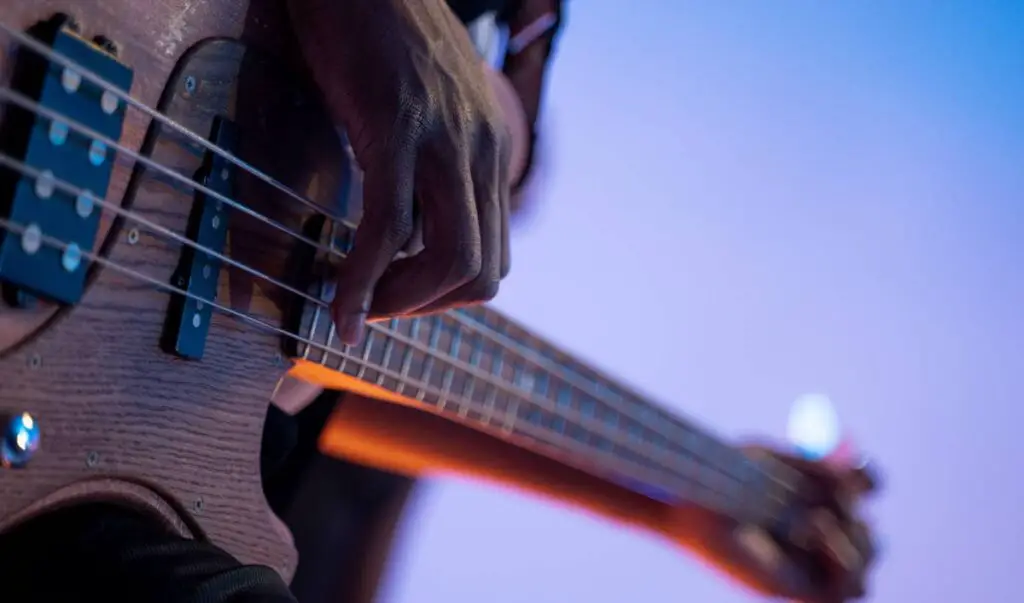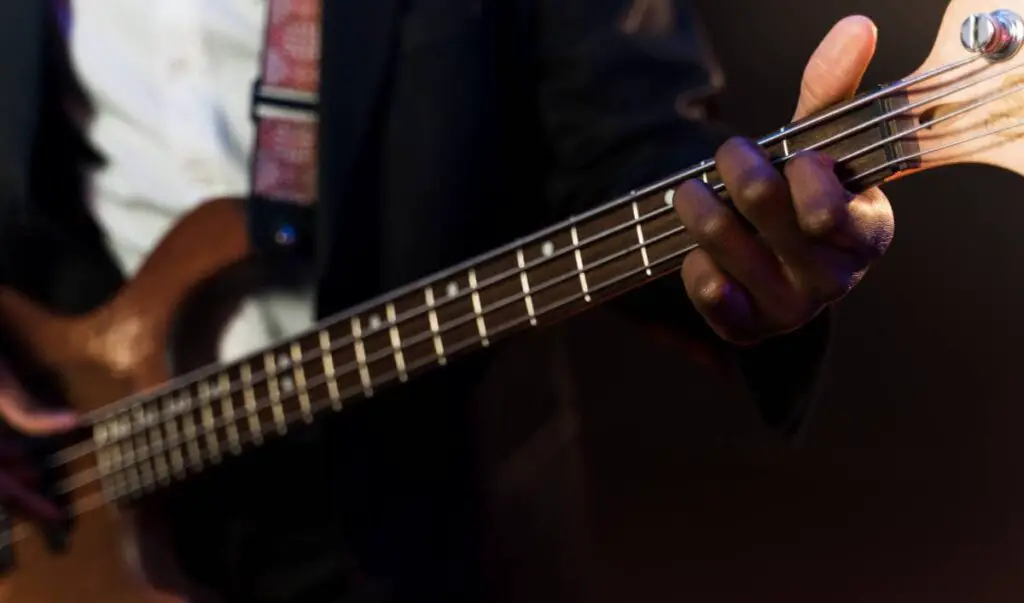While some of us love the bass and think it’s the coolest instrument ever, others find themselves asking: why would anyone choose bass over guitar?
After all, guitarists tend to get more attention, play solos, and get to play the riffs that make songs memorable.
Bassists, on the other hand, tend to get overlooked, rarely have lead parts. Oftentimes people say that they can’t even hear what the bass is playing.
So why do people choose bass over guitar? Well, after playing the bass for more than 14 years I have several reasons of my own. This is also a subject I have talked to countless guitarists and bassists about over the years. Thus, I made this list of why people chose the bass over the guitar as I can base it on real-life experience.
1. Its an ego-free instrument
Our personality has a major impact on our interests and preferences. This also goes for what instrument we decide to pick up.
The bass is a great instrument for anyone who is patient, mature, and understanding, as these are some of the most essential personality traits for a bassist.
Bassists tend to be more interested in being part of something bigger than themselves and playing their part, rather than feeding their own ego. They also need to be in sync with both the drummer and the guitar player in order to make a band sound united.
It’s not a job that everyone is capable of, but for some, it provides a lot of fulfillment and enjoyment
In many genres, the focus will be on the guitarist and the vocalist. For people who would rather serve the song than standing in the spotlight., choosing the bass over the guitar is a natural choice.

2. The grooves
Do you prefer riffs or grooves? This question alone could determine whether you should choose the bass over the guitar or not.
When someone hears a song they like, they will generally get a riff stuck in their head. However, some of us will find ourselves humming on the bass groove instead.
When a person is more drawn towards the grooves, they are also generally more drawn towards picking up the bass. More often than not, this ends up being the right choice. This is because understanding the importance of groove when listening to music tends to translate to understanding its importance when playing it too.
Ed Friedland of the Mavericks sums up the importance of playing a groove well with the following quote:
“I like the virtuoso thing when it’s time for that, but when I’m playing with the band I always have to be locked in with the drummer and grooving.”
Ed Friedland, Bass Grooves: Develop Your Groove and Play like The Pros in Any Style
Regardless of how flashy or simple a bassist plays, they will always be holding a groove. Thus, when someone prefers and is drawn towards the groove instead of the riffs and solos, picking the bass over the guitar is a no-brainer
3. The percussive sound
Some people would like to play a percussive instrument, but they don’t want to be a drummer.
It turns out that bass is a perfect middle-ground for anyone who feels this way.
This is because the bass can provide a percussive sound to a band to a much larger extent than the guitar. Here are just some of the ways you can get a percussive sound with a bass:
- Adjusting the tone
- Slapping
- Popping
- Strumming muted strings
- Acenting notes in time with the drums
- Drumming on the body
How a bassist can incorporate these techniques depends on the genre and type of band, but there will always be room for it. A great example of this is Korn`s bassist, Fieldy, who uses a slapping technique and tone that makes his playing sound incredibly percussive.
“I want it to be an almost percussion-sounding instrument rather than a bass, because I’m like, ‘If you guys need bass, you can get it from the kick drum.”
– Fieldy, GuitarWorld interview from 2020
Other bassists have created a similar sound by playing with their thumb and turning down their low frequencies. Percussive bass sounds are thus often associated with slapping, which leads us to:
4. Slapping and Fingerstyle
While the guitar can be slapped or played fingerstyle, it is typically played with a pick.
Thus, while Playing bass with a pick is great, it is often fingerstyle or slapping that makes someone pick the bass over the guitar specifically.
Personally, I was drawn towards fingerstyle as I loved the tone and how bassists looked when they played that way. It didn’t take long for me to start loving how it sounded and how natural it felt once I picked up the bass. While I had always loved guitar as well, playing with a pick never had this type of appeal to me.
I’ve talked to many bassists over the years who had similar experiences with fingerstyle and slapping. Others were initially drawn towards one technique but switched to one that suited them better once they became familiar with the bass.
Slapping in particular is a distinct technique that appeals strongly to some, oftentimes the very first time they hear it. Here is a great example by Bruno Tauzin of how captivating great slapping can be:
5. It`s easier to find a band
While playing bass alone is fun, nothing beats playing with a band.
Due to bass players generally being in demand, finding a band is significantly easier than for guitar players. This is especially relieving, as getting the most out of your experience as a bassist relies on playing with other people.
Despite many bands having two guitarists, it is still much harder for a guitarist to find a band. This is due to the sheer amount of 6-string players out there.
This is something that no musician wants to deal with, we all just want to play. For some, the ease of finding a band is important enough to impact their choice of instrument.
In this list of the 10 most popular instruments to play, guitar, piano, and drums are all in the top 4. Bass guitar, on the other hand, is not even on the list. Thus, picking up the bass will make it a breeze to find people to play with.

6. They switch to it
While there are many noble reasons to pick up the bass, others pick it up because someone has to do it. This tends to happen to musicians that have experience with a different instrument, but there isn’t space for them in a band. Most commonly, this happens when there are too many guitar players.
While this creates bassists out of happenstance, it is also extremely common for people to quickly fall in love with the bass when this occurs.
Here is a list of just some successful bassists that started of as guitar players:
- Paul McCartney – The Beatles
- Geezer Butler – Black Sabbath
- Greg Lake – King Crimson / Emmerson, Lake & Palmer
- Lemmy – Motorhead
- Geddy Lee – Rush
- Rick Danko – The Band
- Mike Dirnt – Green Day
- Shavo Odajian – System of a Down
And the list goes on.
Converting to bass from guitar is unfortunately looked down upon by some. In reality, this often leads to passionate and talented 4-string players, and some of the most legendary bassists started out this way.
7. Bass bridges rhythm and melody
The bass is a bridge instrument. This means that it creates a bridge between the rhythmic and harmonic elements in a band.
The drums provide percussion, while guitars, vocals, and piano provide melody and harmony. Bass exists somewhere in between, which is also a big reason that it ends up getting ignored as it blends in with the other instruments.
Bassists thus need to be in sync with all the members of a band, as they connect them all together. Holding a band together musically and making everyone sound good will often go unappreciated. Those who can see the value of it and can still find fulfillment from this job, are also well suited to play bass instead of the guitar.

8. Size
The scale length of a common bass is 34″, while a guitar is 25.5″. The distance between strings is also wider on the 4-string bass than on the 6-string guitar.
I have run into bassists who used to be guitar players but gravitated towards the bass simply due to the instrument fitting their hand size better.
Unplayed strings need to be kept muted both when playing the guitar and the bass. For those of us with large hands, this can be a difficult task when the strings are too close to one another. Therefore, some musicians pick bass over guitar simply due to physiological reasons.
Related reading: I have written more about why basses are so long here.
How comfortable you feel with your instrument also has an impact on how much you enjoy playing and rehearsing. It`s also no fun for your hands to be hurting after every single session. Thus, choosing bass over guitar isn’t always about musical preference, but rather what we are more naturally suited to do.
9. They heard a melodic bassist
For some it was Jaco Pastorius, for others it was Cliff Burton. For me, it was Geddy Lee of Rush.
I`ve talked to several bassists who can pinpoint the first time they heard an insane bass solo. This is because for them it is the exact moment they decided to become a bassist.
Most bassists tend to keep things simple in order to serve the song. While this is often a necessity, it also results in few bands showcasing the full potential of the bass.
There is also an overflow of amazing guitarists. The majority of music lovers have also heard plenty of guitar solos. While guitar solos can be amazing, we certainly become more accustomed to them, due to how common they are.
Thus, when someone eventually hears a bassist that can serve a song while playing complex melodic lines, it becomes all the more mindblowing. By the time someone hears a bass solo, they will have heard enough guitar solos to know which of the two speaks to them the most.
For an example of this, here is one of my all-time bass solos. It`s a short and sweet Geddy Lee solo from Rush’s 2011 Time Machine tour:
10. The low end
Some find it hard to hear the low end in songs, but we can all still feel it.
It’s the low end that gives a song the most essential rhythmic and harmonic information. This is one of the main reasons bass has been scientifically shown to be the most important instrument in a band.
The first time someone hears a bass with a great tone that is mixed well at a concert or band rehearsal, they tend to be blown away. For some, this flips a switch in their head that goes “Yup, I`m gonna be a bassist.”
If the guitar hasn’t spoken to the person at this point, there’s also a good chance that it never will.
Being captivated by a boomy and powerful tone is the bass` equivalent to getting entranced by a distorted or beautiful delayed tone on the guitar. Either it speaks to you, or it doesn’t.
Conclusion
The 4-string is not for everyone, but those who chose bass over guitar tend to love it and often become bassists for life.
A good bassist will shift the attention away from themselves and unto the song. Still, this is not to say that bass players can`t be flashy. I, like many others, picked up the bass because we were inspired by a technical bassist. For some bassists, it`s all about being flashy, while still serving the song.
Inspirations, physiology, personality, goals, musical preference, and style are just some of the reasons someone might pick the bass over the guitar. Despite there being 6-string basses that are tuned like guitars, these are vastly different from guitars and people chose to play them for vastly different reasons.
Every bassist will have a different background story, but they tend to share one thing in common. They all grew to become incredibly passionate about the bass, and would never trade it for a different instrument.
If you want to learn more about the difference between bass and guitar, read my article on whether you can play bass on the guitar. It will further showcase the difference between the two instruments, and how you can do both if you are struggling to choose between them.

